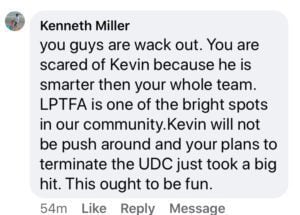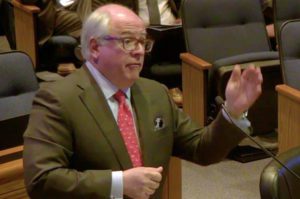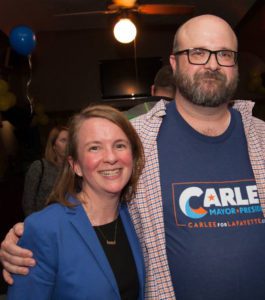According to an email request from DDA’s Anita Begnaud, the meeting to decide who gets $100,000 to “manage” the five taxing districts, could be held at an undisclosed location as early as Monday, June 7th, 2021. Sources say this meeting will take place at 4:30pm on Monday, June 14th, at the Rosa Parks Center auditorium.
A reader who’s been following along for a while should remember the waining moments of the Joel Robideaux administration. That’s when he asked and the City-Parish Council delivered five brand new 1¢ or 2¢ sales tax districts across the poorest areas of the City of Lafayette. When I say the waining moments, I mean a special meeting called in the last half-hour of his administration and the previous council’s tenure. Here’s an excerpt from our article about it at the time.
… the council introduced five new tax districts on November 19th. That was only THREE-DAYS after they were re-elected on November 16th. After all, they couldn’t very well have announced their intention to immediately raise your taxes without it impacting their re-election campaigns.
In fact, the timing of all this was so precise that it wasn’t until the last half-hour of Joel Robideaux’s administration that these five new taxing districts were signed into law. My working theory: it managed to get councilmen re-elected who were friendly to the taxes while simultaneously preventing Josh Guillory, a staunch critic of these taxes, from vetoing them. An added bonus for the tax-and-spend councilmen is this setup blocks all executive oversight. That means they would be free to pass all the taxes they wanted, also without the possibility of veto.
Fishman Haygood’s Charles Landry makes it rain
As fate would have it, in the same year that all of these taxing districts magically materialized in Lafayette’s City-Parish Council, Charles “pro-bono” Landry made a blog post titled “Economic Development Districts = Tax Dollars to Developers.” If you don’t remember who Charles Landry is, he’s the guy that appeared at a Lafayette City-Parish Council meeting, at the behest of Joel Robideaux, to promote these taxing districts. At every meeting I’ve attended, Mr. Landry goes out of his way to drive a point: he’s doing everything pro-bono (for free).
If providing free services really is the case, they’ve been awfully busy. The agenda (in original word format) sent out by Kevin Blanchard was authored by Tracy Taylor, whose LinkedIN profile says she’s an executive assistant at Fishman Haygood since May of 2018. She took that position a few months after dissolving her own LLC, “The Long Con, LLC.” That’s a very compelling company name.
What is a “long con?”
Wikipedia has a definition for the term, “long con,” which can be found under the heading “Confidence trick.” The term means “a scam that unfolds over several days or weeks; it may involve a team of swindlers, and even props, sets, extras, costumes, and scripted lines. It aims to rob the victim of huge sums of money or valuables, often by getting him or her to empty out banking accounts and borrow from family members.”
Dictionary.com defines “long con” this way: “an elaborate confidence game that develops in several stages over an extended period of time wherein the con man or swindler gains the victim’s trust, often bypassing small profits with the goal of reaping a much larger payout in the final maneuver: The key to pulling off a long con is giving your marks the illusion of control while you and your team manipulate their choices.”
Can you think of a more appropriate description of the process used to create these taxing districts?
Where have we heard pro-bono before?
If that pro-bono junk sounds familiar, it’s because they used the exact same trick for “Fix the Charter.” That’s when Bruce Conque, Jay Castille, and Kenneth Boudreaux convinced demographer Mike Hefner to redraw the city and parish council districts “pro bono.” Next thing you know, LCG was writing a check to Hefner’s company, Geographic Planning & Demographic Services, for $9,000. An article from the Daily Advertiser suggests it was slightly more than that, at $9,500. So much for pro-bono.
Well, it turns out that once a trick works they’d be stupid to not try it again. So, Charles “pro-bono” Landry did all kinds of “free” work “over an extended period of time… bypassing small profits with the goal of reaping a much larger payout in the final maneuver.” That final maneuver appears to be five no-bid contracts for his firm, amounting to a small fortune of about $50,000. Plus fees later, as needed.
I know this because each of the five taxing districts approved Charles Landry’s unsolicited proposal, at the behest of Kevin Blanchard. Each of those proposals lists Landry’s firm, Fishman Haygood, as the recipient of $10,000. I’ve been told that all five documents are almost identical. So far, I’ve acquired three of them. They are, the Downtown District, the Trappey District, and the University Gateway District. Northway and Holy Rosary are the only ones unaccounted for.
Team Carlee’s Kevin Blanchard trying to get PAID!
In addition to cutting out $50,000 for himself, Charles “pro-bono” Landry’s proposals also set aside $20,000 for “administration” of each taxing district. Multiply that by all five districts and it’s a very tidy sum of $100,000. While the district boards (read the Lafayette City Council) did elect to give Charles Landry $50,000 out of the gate, the selection process for the “administrator” was to happen later. According to an email request from Anita Begnaud, that “later date” is supposed to happen as early as Monday, June 7th June 14th, 2021, at 4:30pm at the Rosa Parks Center auditorium.
Who will administer the five districts hasn’t been made clear to the public. However, we do know that Kevin Blanchard has expressed interest that his new organization, LPTFA, be in the running. He sent out the email invitation for the March 5th meeting, during which the Fishman Haygood proposal was accepted. He also called the meeting for February 4th, which was hosted at the office of Monique Boulet, daughter of former governor Kathleen Blanco. That February meeting was when “pro-bono” Landry said the customary administration fee for taxing districts is 5% to 15% of the take, err, I mean revenue extracted from the public.
How’d Blanchard end up at LPTFA?
LPTFA stands for Lafayette Public Trust Financing Authority. They sell low-income housing tax credits and use the margin to finance their lifestyles. Every single thing the organization touches loses money. If not for those federal “tax credits,” they’d have been bankrupt years ago. When cash starts running low, they just sell more tax credits. Several of their money-pit endeavors are mentioned in an earlier article.
Those who’ve been following Lafayette politics for a while know that Kevin Blanchard used to be the Chief Development Officer for Lafayette Consolidated Government. In fact, that job didn’t even exist until Joey Durel created it for Kevin Blanchard in 2013. Shortly thereafter, in late 2014, he became the public works director, while his friend Carlee Alm-LaBar took over his former CDO position. You may remember that little tid-bit from our article, CGI and the Rise of Carlee. Blanchard then left LCG to take the post of Chief Operating Officer for Southern Lifestyle Developers.

Kenneth Miller, husband of LPTFA’s Program Administrator Rebekke Miller, suggesting that the previously unnecessary Executive Director job was invented especially for Kevin Blanchard for a very specific purpose.
While at SLD, Blanchard was intimately involved in the campaigns for “Fix the Charter” and “Carlee for Lafayette.” When it became evident that Carlee’s mayoral ambitions would fall short, SLD began laying off Carlee sycophants. Despite Carlee’s loss, many of those former SLD employees began finding their way into bureaucratic government positions. These include Rachel Holland getting hired on as the Downtown Lafayette Director of Planning and Development, Clint Simoneaux was named Youngsville’s director of development and planning, and others, including Kevin Blanchard who took the helm at Lafayette Public Trust Financing Authority (LPTFA).
According to Kevin Blanchard himself, his last day at SLD was the last day in February, 2020. It was probably at that moment, and after years of not needing one, that LPTFA suddenly realized they couldn’t get along without an Executive Director. Nine days later, on March 9th, they began advertising for the position. By May 18th, 2020, the requisite amount of time had passed. So, the board called a special meeting to unanimously award Kevin Blanchard an annual salary “not to exceed” $130,000, to head an organization with only a handful of employees. To put that into perspective, Josh Guillory only receives $119,385 (Page 358 of the 2020-2021 LCG adopted budget) to manage the entirety of Lafayette Consolidated Government. That includes 2,239 employees (manning tables from the 2020-21 budget, pages beginning on 357) and a financial annual budget of a half-billion dollars ($518,000,000 – page 30 of the same budget.)
The cut: Blanchard to get $60,000, Boulet will get remaining $40,000
It was my belief that Kevin Blanchard is pushing for LPTFA to manage a portion of the districts leaving Governor Blanco’s daughter, Monique Boulet, to manage the rest through her Acadiana Planning Commission. Obviously, one of the organizations would end up with three districts, leaving the other with only two. Since Kevin is doing the bulk of the “work,” I felt he would end up with the lion’s share of the money.
It turns out that I was exactly right. Anita Begnaud’s email announcing the June 7th meeting (now taking place at 4:30pm on Monday, June 14th at the Rosa Parks Center auditorium) contains the breakdown of who’s getting what. After a year of tax collections, some of these districts have the $30,000 on hand to pay, others do not. Here’s the amount of money these districts have syphoned out of our local economy, along with a link to the Lafayette Checkbook where these numbers update themselves monthly.
Kevin Blanchard’s list
- Downtown – $312,053.30 – Downtown Data
- Northway – $318,997.89 – Northway Data
- Holy Rosary – $22,740.67 – Holy Rosary Data
Monique Blanco Boulet’s list
- University Gateway – $335,058.53 – University Gateway Data
- Trappey – $2,438.867 – Trappey Data
As of this writing, all told, the Lafayette City Council (by way of various taxing districts not approved by the voters) has taxed residents exactly $991,289.25. That accounts for only nine-months of collection: August of 2020 through April of 2021. A full year would estimate to $1,321,719.00. Keep in mind, Lafayette’s Home Rule Charter, Article II, Section 17-D says: “All proposals to renew, levy a new or increase an existing sales and use tax shall be submitted to the voters for approval…” That process never played out because these districts were gerrymandered especially to include businesses only, avoiding all voters.
###
Don’t just sit there, do something!
Citizens for a New Louisiana is the only organization in Louisiana dedicated to reforming local government. With the help of numerous volunteers we are making some progress. However, there’s much more work we could be doing. Making a difference will take a little more than reading an article every now and then. Your community doesn’t need another spectator. They need someone willing to step onto the field and become a real part of the solution.
Help us to achieve the vision of creating a new, propserous state by becoming a Citizen of a New Louisiana. Become a Citizen Make a Donation Tax Deductible Gifts










